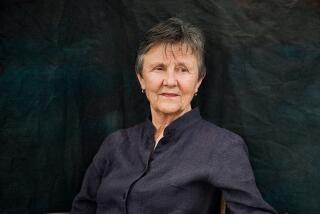Robert Penn Warren Dies; Revered for Poems, Novels
- Share via
Robert Penn Warren, the prolific master of American letters who wrote the scathing classic of political corruption, “All the King’s Men,” and decades later was honored as the nation’s first poet laureate, died Friday at his summer home in Stratton, Vt.
“Red” Warren, as his fellow poets knew him for the shock of red hair he had as a younger man, was 84. Friends said the three-time Pulitzer Prize winner had been fighting cancer for three years but had been writing well into the summer before his condition worsened.
In recent days, he had been in a coma.
His wife, author Eleanor Clark, and his daughter, Rosanna, a poet, were with him when he died.
Warren, a Kentucky native, was the first person to win Pulitzer Prizes for both poetry and fiction. He authored more than 50 books and was also hugely influential as a critic, anthologist and educator, teaching at Vanderbilt, Louisiana State, Minnesota and Yale universities.
“He was a remarkable man, a wonderful writer,” said poet, novelist and friend James Dickey on Friday. “The main thing about Warren is that he had a powerful, primitive imagination that dealt with the basics of human existence, either personal, political or religious. . . .
“And he did it to hell and gone. He was an all-out kind of a writer.”
Redefined Literary Criticism
His collaboration with critic Cleanth Brooks, with whom he founded the Southern Review in the 1930s and wrote a series of textbooks, helped to redefine the method of literary criticism. The so-called New Criticism placed a premium on ambiguity, irony, paradox and complexity.
“He was a great poet, fine teacher, and did something to revolutionize the modes of teaching literature,” Brooks said Friday. He called his colleague a “wonderful man and a wonderful writer.”
A proud Southerner with gentlemanly manners, Warren frequently mined and sometimes mirrored the troubled soul of his native region.
“All the King’s Men,” the best-selling 1946 work for which he won his first Pulitzer, was inspired by the rise of populist Louisiana Gov. Huey Long. Warren’s most famous work, it was made into an Academy Award-winning movie in 1949 starring Broderick Crawford as Warren’s Willie Stark, an idealistic politician corrupted by the narcotic of power. The novel was translated into 20 languages and sold 3 million copies.
Among Warren’s other novels were “World Enough and Time,” about a 19th-Century murder, and “Band of Angels,” about a plantation owner’s daughter who discovers after her father’s death that she is part black.
“All the King’s Men” gave Warren a measure of popular fame. But in literary circles, it is the poetry, especially, for which he is esteemed.
‘Judged and Revered’
“Not many people read poetry; we know that,” Dickey said. “But I believe it is as a poet he will ultimately be judged and revered.”
For many, reverence for Warren took root long ago. His first Pulitzer for poetry came in 1958 for a collection titled “Promises.” A biography of Warren was published in 1964--a full 15 years before his second Pulitzer for poetry, for “Now and Then: Poems 1976-1978.”
“Our history is littered with poets who burned out and died young,” said poet and critic David Lehman upon hearing news of Warren’s death. Warren was one of the rare poets who, like Yeats, seemed to get stronger and wiser with age, he added. Lehman was so moved by Warren’s later work that he penned a poem titled “In Praise of Robert Penn Warren.”
Selected by Congress in 1986 as America’s first poet laureate, Warren, characteristically, took an ironic view of the affair.
“The people who create these posts don’t give a damn about poetry,” he said. “They do it because it’s a nice thing to do. They think, ‘There’s a poet down the road; let’s make him a poet laureate.’ ”
Born in Guthrie, Ky., on April 24, 1905, Warren grew up hearing Civil War tales from two grandfathers who had been Confederate soldiers. The red-headed, freckle-faced prodigy was 16 when he entered Vanderbilt University and 17 when his first poem, “Mess Kit,” was published in a military magazine.
At Vanderbilt, he studied under poet John Crowe Ransom and with Ransom became part of a group of writers known as the Fugitives. After Vanderbilt came studies at UC Berkeley, Yale and Oxford (on a Rhodes scholarship). In England, he finished his first published book, “John Brown: The Making of a Martyr.”
The Fugitives thought of the South as having a distinct rural, conservative identity bound by blood kinship. The “big idea” that captivated the group, Warren once said, was the growing alienation of man from nature.
Warren and some other Fugitives later joined a circle of writers known as the Agrarians who championed the Southern way of life. In 1930, Warren penned an essay, “The Briar Patch,” that offered a defense of segregation as a necessity at that point in history. As social conditions changed--and after years of reflection--Warren wrote additional essays disowning his earlier views as wrongheaded.
In “Segregation, the Inner Conflict of the South”--a 1956 exploration of racial issues--he concluded that the fundamental problem is not “to learn to live with the Negro. It is to learn to live with ourselves.”
“He had a hard time living that down,” Dickey said of “The Briar Patch.”
Other aspects of his Agrarian viewpoint, however, remained with him throughout his life.
He told an interviewer in 1980: “The main problem of our time is whether democracy and the human personality as we know it can survive in a world of technology. Technology offers us many things we want, but insofar as it makes man a cipher in the process, it is destroying humanity.”
His poem “New Dawn” was concerned with technology’s more abrupt capacities for destruction. The verses concerned the dropping of the atomic bomb on Hiroshima. A wild party by the crew of the bomber Enola Gay the night before was recalled in this wry stanza:
The optimistic irrelevance of six packs of condoms and three pairs of silk panties.
The mission then unfolds in six stark verses and concludes with the crew returning to base to a search for sleep:
Some men, no doubt, will, before sleep, consider
One thought: I am alone. But some,
In the mercy of God, or booze, do not
Long stare at the dark ceiling.
In an interview with The Times in 1985, Warren described his creative process--of letting the muse settle into a blank mind.
‘Mind Goes Blank’
“Swimming is a wonderful way of writing,” Warren said in the Connecticut home he had occupied for more than 30 years. “Your body is totally occupied, there’s nothing else and your mind goes blank.”
He would be struck by a word, a phrase--”even if you don’t know where it’s going, it has some thrust. You pick a rhythmic phrase, and you let the rhythmic phrase hunt something to tie to.”
A novel, on the other hand, Warren said, “has to come in a flash . . . but then you have to build, you have to do a lot of construction. It takes years, but then there’s an awful lot of trial and error.”
Admiration for Warren was universal.
T. D. Young, a retired literature professor at Vanderbilt, said he discovered on a lecture tour through England, Scandinavia and Poland that Europeans were more appreciative of Warren as a novelist than were his fellow Americans.
Many Europeans, he said, placed Warren in company with William Faulkner as America’s greatest novelists.
“They liked Red more than Hemingway,” Young said.
Poet Robert Bly called Warren “astounding. It’s very seldom that someone can write poetry and fiction and do it well. In fiction, you take nine or 10 generations and compress them; in poetry, you take 30 seconds and expand it.”
Novelist Eudora Welty, whose first work was published in the Southern Review when Warren was editor in the 1930s, said: “He had such vigor and such love of life. He was such wonderful company. He was the soul of hilarity.
‘Generous and Giving’
“He was a good friend to writers--constantly generous and giving.”
Upon his selection as the United States’ first poet laureate, however, Warren made it clear that there would be a limit to his generosity.
His duties would be to advise the Library of Congress. Unlike poet laureates of England, who are expected to produce poems to mark high official occasions and who in ages past waxed poetic at the behest of royalty, Warren could not or would not do that.
“I was in Vermont once on the edge of the woods, and suddenly, phoooom, partridges came flying out of the brush and into the sunset,” he once said in an interview about the spirit of poetry. “It’s the same thing with a poem. You can’t force it.”
He would not have accepted the position, Warren added, if “I had been required to compose an ode on the death of someone’s kitten.”
More to Read
Sign up for our Book Club newsletter
Get the latest news, events and more from the Los Angeles Times Book Club, and help us get L.A. reading and talking.
You may occasionally receive promotional content from the Los Angeles Times.








